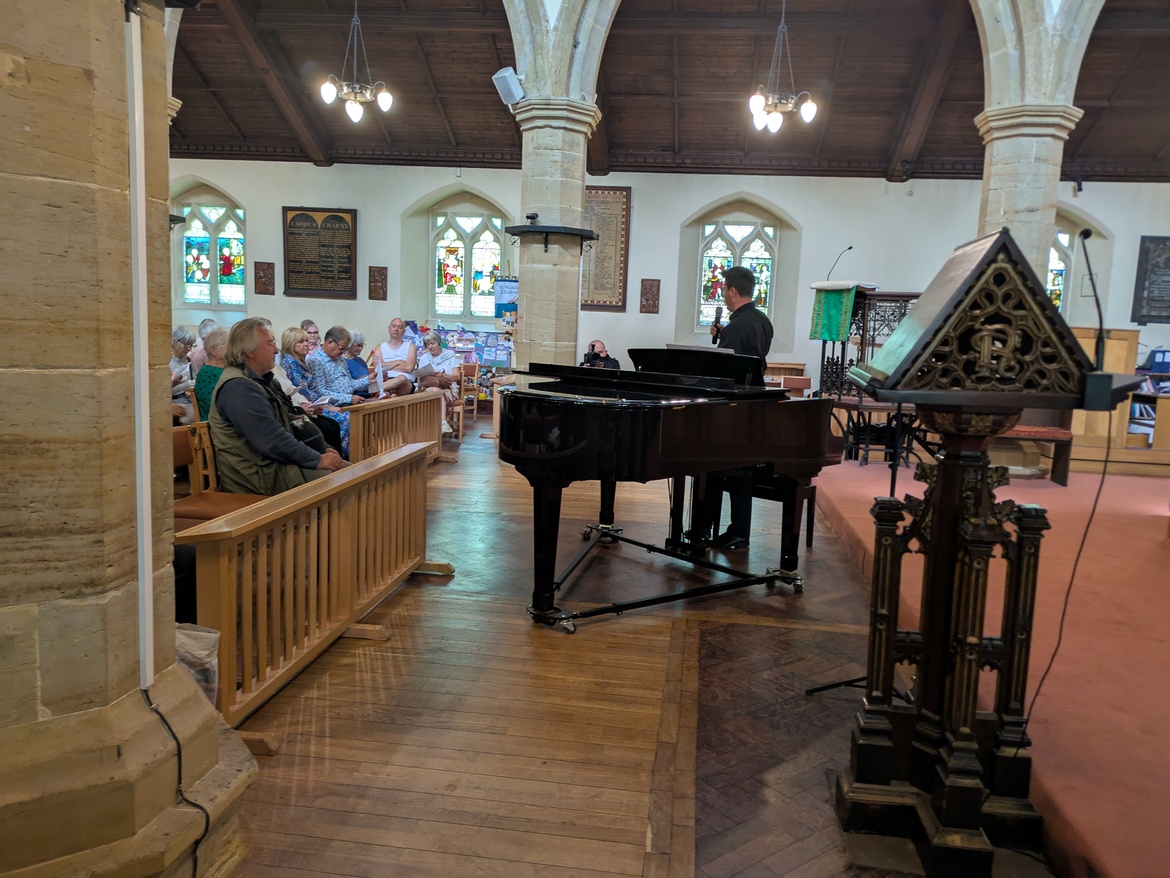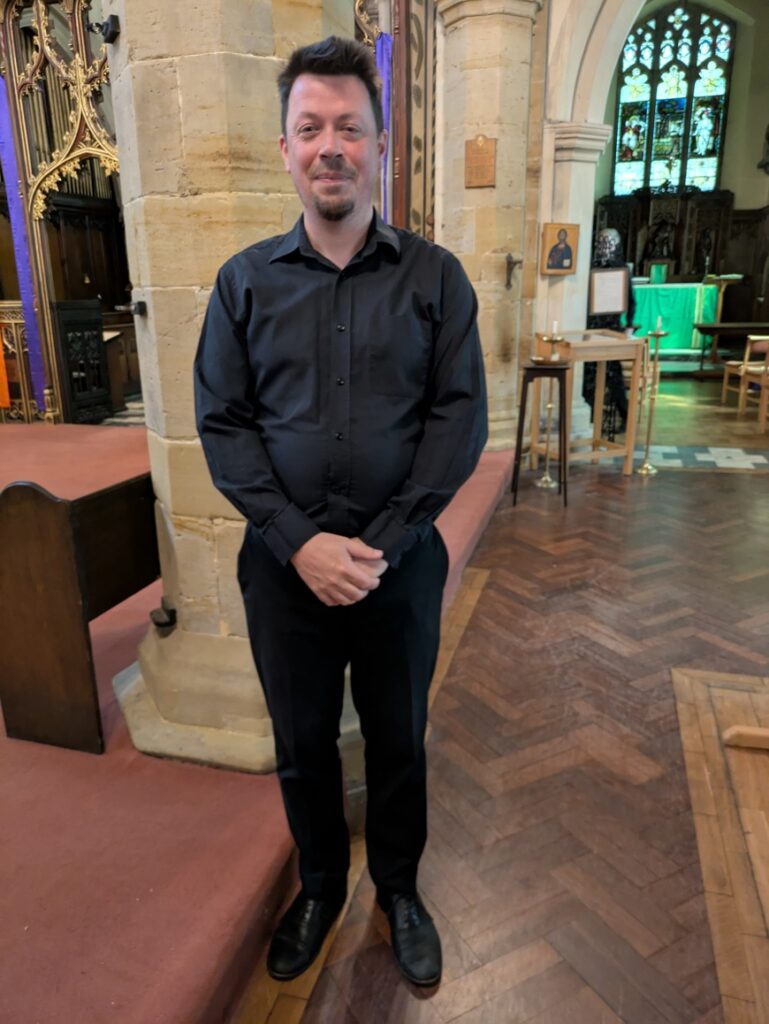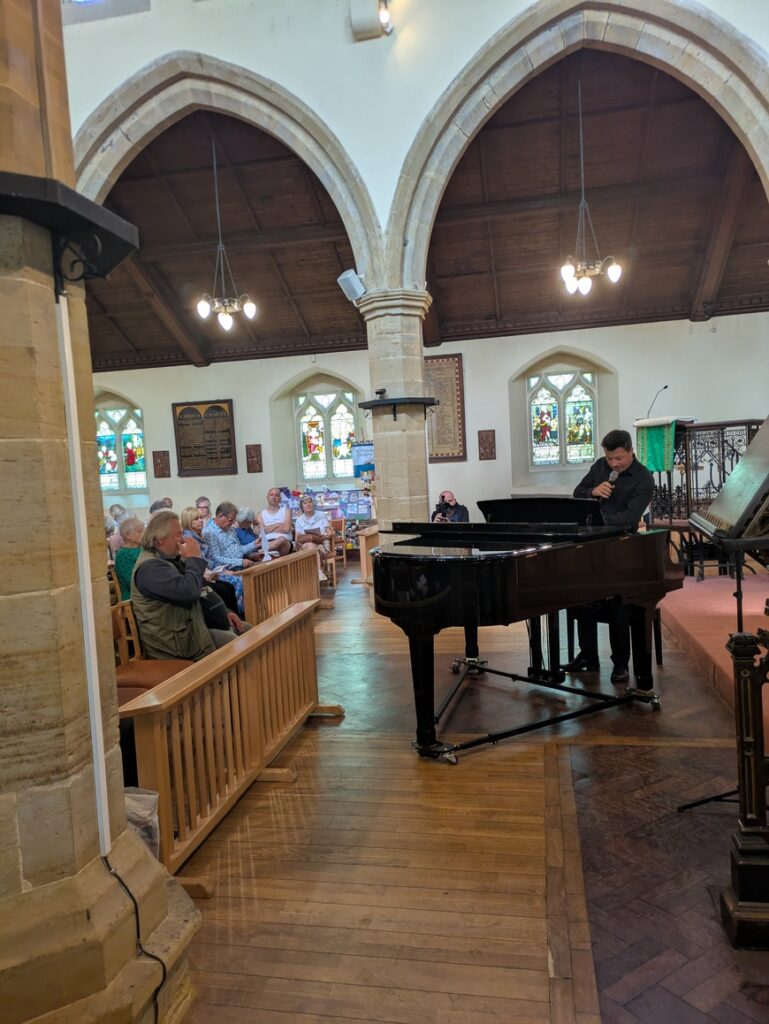Review by Simon Jenner, August 6 2025
Composer, educator and baritone Matt Jelf does something remarkable in a programme entitled ’Melancholy Minstrels and Moonlit Melodies’. He gives a song recital accompanying himself on piano. Composer/songwriter Reynaldo Hahn managed this on occasion (with a cigarette hanging from his mouth), and a few others. But it’s still a great feat and very unusual. Not least because you have to project from sitting down. That poses challenges for the diaphragm. Jelf surmounts those as if they don’t exist.
Being a composer like Hahn gives Jelf what Ravel said to pianist/composer Robert Casadesus as a compliment, when Casadesus played Ravel: the ability to strip back to the authentic compositional voice without accretions; and from inside that vein of creativity.
Jelf begins with a powerful if brief 1852 Franz Liszt work: ‘Es Miss einwunderbares sein’ about the entwining of two lovers. It’s enharmonically shifting and sexily rich. The surprisingly sparse piano part winds slowly as the melodic line wraps round it. Those who don’t know Liszt’s songs will be surprised at how Liszt, as in his voluminous transcriptions of nearly all music (it seems) puts himself at the service of the composer; and here, the words.
I’ve never heard of Oskar von Redwitz-Schmolz (1823-91), and neither have you; or will again. He was a poet and professor of literature and aesthetics. Hence the ‘souls’ enwrapped and not bodies. Liszt puts bodies back in a long melismatic soaring. Jelf memorably expresses a song often rendered by a soprano.
Benjamin Britten’s arrangements of ‘The Salley Gardens’ and ‘O Waly Waly’ are folksongs beautifully rendered with a low thrumming in the piano; and a muted folkloric sigh. Jelf is unhurried and there’s August in his voice too as these unfold. Naturally he doesn’t produce something like Rachmaninov’s ‘Spring Torrents’ but his capacity to bifurcate two mediums so well is remarkable. His pitch here is deeper than say Peter Pears and somehow more fitting.
Kurt Weill’s 1947 opera Street Scene is underrated partly because there aren’t the big tunes we associate with him. This is a great pity as it’s the most profound work he ever did shortly before his early death (in 1950 aged 50). With a book by Elmer Rice, the lyrics are by the Haarlem Renaissance’s leading Black poet Langston Hughes no less. ‘Lonely House’ is the song sung by the aspiring young Sam Kaplan, in love with a young woman on the verge of life but faced with terrible choices. It’s a wonderfully atmospheric piece and Jelf’s aching performance made me appreciate it the more.
John Dowland’s ‘Flow my tears’ being a lute song has a rich but not overly complex instrumental part transposed atmospherically from the lute. Interestingly though it started as a purely instrumental piece from 1596, then with words probably by Dowland himself to fit it, it was published in 1600. And there’s a suggestion Dowland cribbed a melodic line from a motet written by the recently dead Orlando Lassus. Jelf shades his voice to late Elizabethan expressiveness in this greatest (perhaps) of Dowland’s “Semper Dowland Semper Dolans” (always Dowland, always doldrums) mode. It still has power to shock because it crosses the melodic decorum of the time with a high register at crucial points, and its downright vehemence somehow slows to tear-point.
Peter Warlock (real name Philip Heseltine 1894-1930) was born over three centuries after Dowland (1563-1626) but he adored that period. So much of his music sets the same lyrics as the Elizabethan and Jacobean lute composers. Warlock shared their ‘Consonance anglais’ (or the faint echoes of it by the late 1590s). ‘Sleep’ is a superb 1922 setting of a 1607 poem by John Fletcher; even if just surpassed by his contemporary Ivor Gurney’s earlier (1913) version. But set in the utterly remote key of G flat minor (all thwarted immanence, as G flat’s meant to portray it, as in Wagner’s Tristan und Isolde), it touches its own dark magic. And the voice barely spans an octave in a low, ruminant register.
Both Gurney and Warlock were extremely troubled; like Schumann and Wolf, though the demons were less physically induced. Indeed song composers seem prone to higher rates of mental distress than other composers. No-one though faced utter blackness like Warlock.
Poulenc’s 1935 ‘A Sa Guitare’ is a Gallic gallantry almost in the mood of Dowland. That’s not surprising as the words are by the great poet and sonneteer Pierre de Ronsard (1524-85). It’s discreetly 20th century and not in an obvious Poulenc idiom, but one shaded and deflected to Ronsard’s time: the man sings to his guitar sotto voce. Fascinating. And followed by Brahms (that’s unusual in itself) in ‘An eine Ailsharfe’. It’s a quite early (1862) song from his five Op 19 Lieder – of how nature understands the woman’s or man’s loss (“the boy who was so dear to me”). Deeply literary and melancholy it’s also brightly coloured by natural imagery, as befits a poem by Eduard Morike (1804-75); who was later set so often and so memorably by Hugo Wolf, who appears later.
Brahms’ mentor Schumann sets a poem in Catholic Augsburg where a girl the singer loves is taking the veil. This (the mostly forgotten Friedrich Silcher (1789 – 1860) wrote it in 1830) is a standard trope of Biedermeier and earlier Romantic regret. ’Stirb, Lieb’ und Freud’ the second of his Op 35 set (like many songs, from 1840, his ‘Year of Song’) is strophic in feel if not fact. It’s suddenly interrupted by a church organ evoked on the piano part, and a stratospheric high voice part at one point invoking the young woman marrying God. It’s also quite slow and winding in its emotional affect.
Erich Wolfgang Korngold (1897-1957) blows that away with a happy song (Korngold was often at his best here) in ‘Gluckwunsch’ from his late (1947) Op 38 set of five lieder, which is simply wishing happiness; or even (decisively not invoking Cliff Richard, ‘Congratulations’). The words might be Korngold’s and the translation certainly is. Written the same year as ‘Lonely House’, it was a short step to Kurt Weill’s world, a composer three years Korngold’s junior and usually a world away. At this point both were in America. But this is a rapt art song full of sun in words and music, and radiant harmonics.
Alban Berg’s (1885-1935) brief early ‘Im Zimmer’ (by Johannes Schlaf of whom I know nothing) flits by in a rapturous post Brahms world with Strauss the main exemplar. It sounds close to the Korngold though written 1905-07 – when the sickeningly precocious Korngold was already writing in his mature style! It’s a small gem though, and Berg included it I his self-deprecating Seven Early Songs of 1907. Later Berg would as a Schoenberg pupil go in to write astonishing work; but his many (perhaps 100) early songs unpublished for so long find him here a contemporary of late Romantics like Strauss above all, Mahler, Franz Schreker, Joseph Marx and indeed Korngold.
Hugo Wolf (1860-1903) wracked like Schumann with syphilis and a composer of frantic spurts and silences composed the gnarliest late Romantic German songs and ‘Harfenspieler 1’ an 1891 setting of Goethe, is the lament of one who wishes the dark and solitude to grieve. It’s like an utterance that wells up and finishes with harmonic suspension with a question mark.
Finally. Schubert’s 1825 song ‘Nacht und Traume’ (D827), as Jelf says in one of his elegant introductions, steers a middle course between that sorrow and earlier joys in B major with G major undertow. Being Schubert the major can be radiant through tears. Whether the singer sleeps or dies is up to us. It’s what sometimes became the Linden Tree moment from Schubert to Mahler.
But no Linden Tree in sight here, which makes it ambiguous and even consolatory. And the undulating sway of the piano part with its two-note rhythms is certainly a lullaby. Leading Viennese poet Matthaus Casimir von Collin might be forgotten but he produced a worthy enough text – indeed Schubert often set him. Jelf’s voice arcs over with a haunting consolation. It’s a wondrously mellowed but also memorably refined recital. One listener called it ‘organic’ and I can steal that.
Good too that Brighton-based Jelf provides full text and translations by composer Richard Stokes (the last by Richard Wigmore). A hidden gem on the South East scene.




